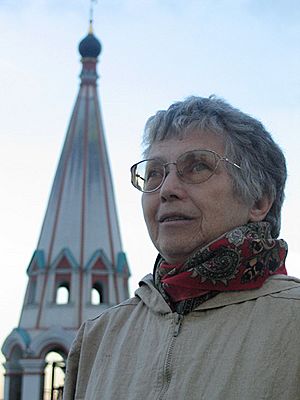Natalya Gorbanevskaya facts for kids
Natalya Yevgenyevna Gorbanevskaya (26 May 1936 – 29 November 2013) was a brave Russian poet and translator. She was also a strong civil rights activist. Natalya helped start and edit A Chronicle of Current Events. This was a secret newspaper that shared news about human rights problems in the Soviet Union.
In 1968, she joined seven other people in a protest. They protested in Red Square against the Soviet Union's invasion of Czechoslovakia. Because of her activism, a Soviet court sent her to a mental hospital in 1970. She was released in 1972. In 1975, she moved from the Soviet Union to France. Later, in 2005, she also became a citizen of Poland.
Contents
Early Life in Moscow
Natalya Gorbanevskaya was born in Moscow, the capital city. She studied at Leningrad University and finished her studies in 1964. After university, she worked as a technical editor and a translator.
Only a few of her poems were officially published in the Soviet Union. Most of her writings were shared secretly, a practice called samizdat. This meant people copied and passed around her works by hand. Other poems were published outside the country.
Standing Up for Rights
From 1968, Natalya became very active in what was known as the Soviet "dissident movement." Dissidents were people who disagreed with the government. They spoke out against unfair rules and actions.
A Chronicle of Current Events
Natalya was a founder and the first editor of A Chronicle of Current Events. This secret publication reported on human rights violations in the Soviet Union. She gathered and edited the reports. Then, she typed the first copies for others to share widely.
The Red Square Protest
On August 25, 1968, Natalya joined seven other protesters. They went to Red Square in Moscow. They were protesting the Soviet Union's invasion of Czechoslovakia. This invasion happened when Soviet tanks entered Czechoslovakia.
Natalya had just had a baby, so she was not immediately arrested with the others. She used this time to write about their trial for the Chronicle of Current Events. She later published this information in a book called Red Square at Noon.
Forced Hospitalization
In December 1969, Natalya Gorbanevskaya was arrested. In July 1970, she was put on trial. The court said she was guilty of crimes while being "of unsound mind." This was a common way to silence people who spoke against the government.
Natalya was sent to a special psychiatric hospital. She was diagnosed with "sluggish schizophrenia." This was a fake illness often used to lock up dissidents. She was released from the Kazan Special Psychiatric Hospital in February 1972.
Life in Exile
In December 1975, Natalya Gorbanevskaya moved to Paris, France. In Paris, French doctors examined her. They found that she was mentally healthy. They concluded that she was sent to the hospital for political reasons, not medical ones.
For a while, Natalya was quite famous in Western countries. In 1976, singer Joan Baez released a song called "Natalia," dedicated to her. Joan Baez praised Natalya for her courage.
Another writer, Adrienne Rich, also wrote a poem called "For a Sister." This poem honored Natalya and other women wrongly imprisoned.
Natalya was stateless for 30 years, meaning she had no official country. But in 2005, Poland gave her citizenship.
In 2005, Natalya took part in a TV show called They Chose Freedom. This show was about the history of the Soviet dissident movement. In 2008, she signed the Prague Declaration on European Conscience and Communism.
Natalya Gorbanevskaya passed away in her home in Paris on November 29, 2013.
Remembering the Red Square Protest
In August 2013, Natalya returned to Moscow. She participated in a rally to remember the 45th anniversary of the Czechoslovakia invasion. Police quickly broke up the rally. Ten people were arrested, but Natalya was not. They were released after many international protests.
Awards and Honors
Natalya Gorbanevskaya received several important awards for her work.
- In October 2008, she received Poland's Marie Curie Award.
- In the same year, she was nominated for the Angelus Central European Literature Award.
- On October 22, 2013, Charles University in Prague gave her an honorary medal. This was for her lifelong fight for democracy, freedom, and human rights.
- On October 27, 2014, after her death, she received Slovakia's highest award. It was called the Order of the White Double Cross. This award honored her efforts to defend democracy and human rights.
See also
 In Spanish: Natalya Gorbanevskaya para niños
In Spanish: Natalya Gorbanevskaya para niños
- Chronicle of Current Events
- samizdat
- 1968 Red Square demonstration
 | Laphonza Butler |
 | Daisy Bates |
 | Elizabeth Piper Ensley |


